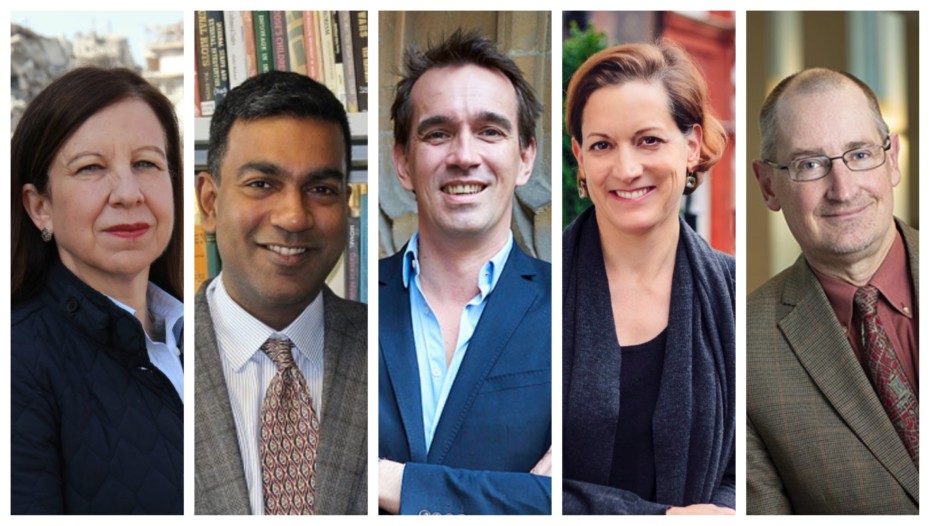
Five eminent historians and journalists were recently announced as jurors for the 2020 edition of the Cundill History Prize. Administered by McGill University since 2008, the Prize boasts the biggest purse for English-language non-fiction writing in the world, with US$75,000 awarded to the winner and US$10,000 to each of the two runners-up.
For some jurors, this is a kind of homecoming: Cundill Prize 2018 jury alumnus Peter Frankopan, Professor of Global History at Oxford University and Stavros Niarchos Foundation Director of the Oxford Centre for Byzantine Research, will chair the jury in 2020.
Pulitzer Prize-winning historian Anne Applebaum (John Hopkins, The Atlantic) is no stranger to the Prize, either, having won its highest honour in 2013 for her masterful Iron Curtain. Meanwhile, Lyse Doucet, OBE, CM, Chief International Correspondent and senior presenter for the BBC, who has been posted to many war-torn areas, returns to her Canadian roots to bring her unique perspective to the jury. Also joining the jury are University of New Hampshire Professor of History Eliga Gould, a Jamestown Prize winner and George Washington Book Prize finalist whose extensive work on the American Revolution emphasizes the entangled relationships between the U.S. and the rest of the world; and British-Sri Lankan historian Sujit Sivasundaram, Professor of World History at the University of Cambridge and Director of its Centre of South Asian Studies, and a recipient of the Philip Leverhulme Prize for History.
These distinguished jury members will reward the book that best embodies historical scholarship, originality, literary quality, and broad appeal.
“With geographical areas of expertise and interests that span the globe, and a wealth of achievements, prizes and distinctions between them, this is a truly globally-minded, stand-out panel,” said Dean of Arts Antonia Maioni. “We are delighted to have these five jurors on board as the Cundill History Prize works to be a force for good at a very fractured, uncertain moment in time.”
Transitioning online
Indeed, the pursuit of history cannot be isolated from the present. In this time of unprecedented challenges as the COVID-19 pandemic tests people and institutions worldwide, the Prize itself is transitioning online, making the shift towards digital manuscripts and virtual meetings and events.
Furthermore, all of the jurors come together in advocating the insights historians, through their expertise, can provide into current crises, as well as the vital role that history has to play in preventing wanton myth-making (Anne Applebaum); “unlocking other worlds” (Lyse Doucet); taking us out of our “comfort zones” (Eliga Gould); “finding a way out of the toll of the pandemic” (Sujit Sivasundaram); or, as Peter Frankopan summarizes, “making sense of the world around us.”
Over 300 manuscripts submitted
McGill’s Department of History and Classical Studies plays a key role in the Cundill History Prize, by leading the initial triage of over 300 submitted manuscripts, and hosting the annual Cundill Lecture, which celebrates the previous year’s winner. Department Chair Jason Opal remarked how the 2020 jury “highlights the remarkable vitality of historical writing,” especially the field’s “deep engagement” with current events, “placing such events in context and illuminating their origins.”
On McGill’s contribution, Opal elaborated: “History is the ongoing past, not the dead past. In our department, we showcase this by constantly changing – not just ‘updating’ – our curricula and research, and by seeking new scholars in emerging fields such as environmental history and global history. At the same time, we keep our traditional strengths in Canadian history, imperial history and the history of medicine and disease.”
A distinguished McGill alumnus, F. Peter Cundill (1938–2011) believed that it was possible to comprehend the present and arrive at a measured perspective about the future only by first understanding the past. In their strong commitment to history as part of our toolkit to understand our present and look towards our future, the 2020 jurors and their host Faculty continue to embody the very spirit in which the Cundill History Prize was founded.
Shortlist, finalists to be announced in the fall
As the jurors embark upon their summer reading, the McGill community is invited to get engaged and stay connected with the Cundill History Prize over the coming months, as news of virtual events and initiatives, and the announcement of the shortlist and finalists in the fall, are released. Two grand finale events, to be held in Montreal if possible, are planned for November: the Cundill Lecture on November 18, and the Cundill Gala on November 19.
Visit the Cundill History Hub, featuring blog posts from the Cundill community, including Margaret Macmillan and Alan Taylor.
To stay connected for the latest news and announcements, please visit the Cundill website, Twitter feed, Facebook page, and Instagram.
